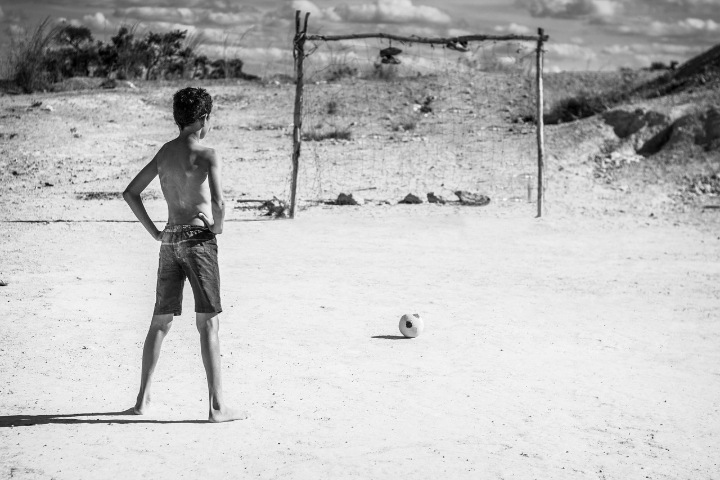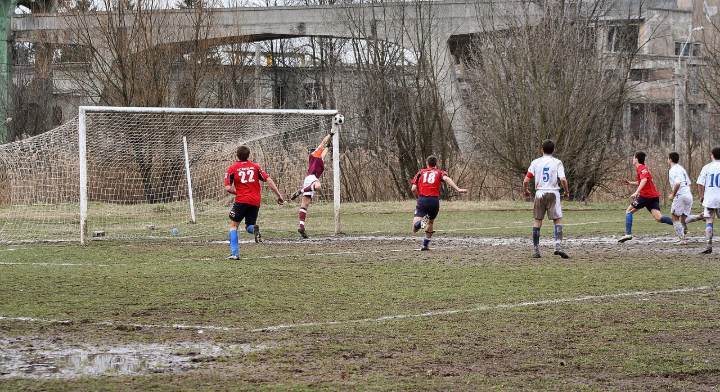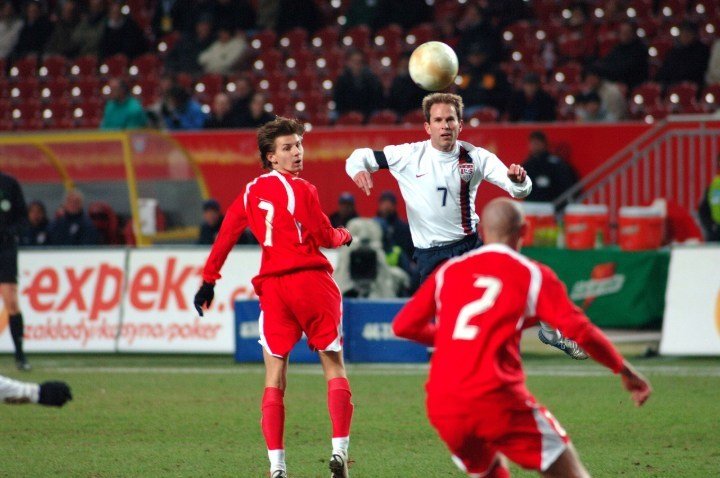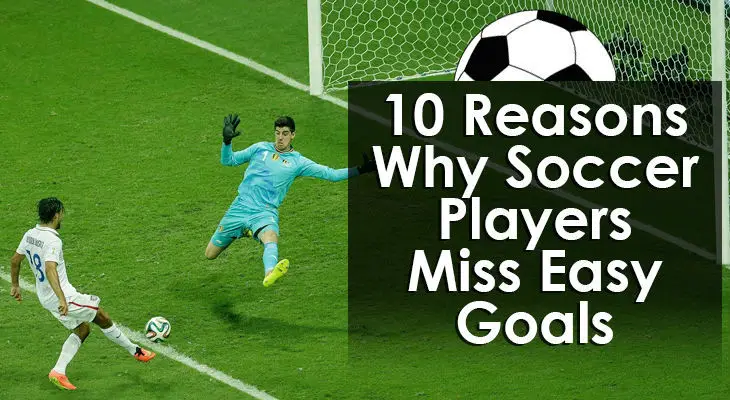10 Reasons Why Players Miss Easy Goals in Soccer
The ability to put the ball in the back of the net regularly is one of the most sought after skills at every level of soccer.
That's why it's no surprise that vast sums of money have been spent on strikers and forwards at the top level such as Mbappe, Neymar, and Ronaldo in recent years.
Regular goal-scorers have always commanded hefty fees as having them on your team greatly enhances your odds of winning.
While some players have the ability to find the net almost every match, others squander a number of easy chances before they finally tuck one away.
Let's take a look at why players miss easy goals, and what players can do to start kicking goals more often.
Why Players Miss Easy Goals
When we dig a bit deeper into why soccer players miss easy goalscoring opportunities, we find that there are quite a number of reasons.
Let's take a look at each reason in-depth.
This will enable us to see where each player is going wrong, and how we can help players ramp up their goalscoring stats.
1. Poor Technique
If a player is consistently missing easy goals when played into great positions, it could be due to poor kicking technique (fix that with this guide).
This could be how they strike the ball, how they control the ball and set themselves up, or whether they're highly one-footed.
The remedy to this is practice.
Make sure there are no glaring weaknesses in the players technique, and then get them attempting shots from all angles using both feet.

2. Not Practicing Against Defenders
While 1-on-0 shooting drills do have their place to improve technique and ensure players are putting in enough reps...
You need to prepare players for games when tackles will be flying in and defenders will be doing their best to stop your players from scoring.
That's why it's important to use shooting drills that involve defenders and put your strikers under pressure.
3. Distractions
With so much happening on the pitch in split-seconds, an easy chance can pass in the blink of an eye.
Whether it's a defender getting in your line of view or a nudge in the back that puts you off, there are many things that can cause a player to take their eye off the ball for a fraction of a second.
And that's all it takes for a shot to go completely wrong.
The world's best finishers are all masters of blocking out distractions.
4. Lack of Experience In Front of Goal
Once you've trained as a striker for thousands of hours, odds are that you'll have scored goals from every conceivable angle with almost every part of your body (except your hands).
This experience then means that you instinctively know how much power to put into each shot and you know where to aim the ball no matter where you are on the pitch.
When players are early in their career they simply won't have this experience and will miss easy goal-scoring chances.
This is also true for players who aren't used to finding themselves in front of goal. They panic and miss the target.
5. Lack of Confidence
This lack of experience and goalscoring knowledge can also lead to a lack of confidence as players just don't trust themselves to score.
Faced with just the goalkeeper before them, they hesitate for too long until the chance is gone or snatch at their shot and skew it wide.
This happens when a player isn't used to being in front of goal (as said in the previous point), or when a player is going through a dry spell where they've been missing easy chances.
When you haven't scored in a while, confidence takes a battering!
We see this all the time in professional players who haven't scored for a number of games and are now missing easy chances which they would have formerly tucked away consistently.
While some remedy this by increasing the amount of time they spend on the training ground, others try to play their way back into form.

6. Lack of Composure
A lack of composure can also be the result of little experience.
For example, if you're surprised to find yourself with an easy chance before you, you may end up panicking and instead balloon the ball over the bar when it should have been a simple goal.
This lack of composure comes down to a player's decision making when they're not exactly sure what to do and start overthinking.
Regular goal scorers such as Messi and Ronaldo, for example, have found themselves in the same position in front of goal time and time again, and now almost instinctively put the ball in the back of the net.
7. Poor Timing
When it comes to finishing easy chances, timing the shot is key.
Players need to understand when to get the shot off and/or when to stick out a foot to divert the ball into the net.
Getting timing right will help players connect with the ball at the right time with the right part of your body and hopefully divert it the right direction.
8. Agility and Strength
Agility and strength may also contribute to missing easy goals.
For example, if there's an easy chance just waiting to be tucked away but you're too slow or not strong enough to hold off your opponent, then you're not even going to make it to the ball to get a shot off.
This goes to show that physical attributes are sometimes just as important as technical and mental attributes.
9. Scared of Getting Hit or Heading the Ball
A lack of confidence in physical abilities can make players worried about getting tackled or barged off of the ball.
Some players dodge challenges and avoid getting on the end of crosses because they're worried about getting hurt.
Some also wince and pull out of headers or refrain from putting their head in where it hurts and this too contributes to them missing easy chances.
While "be brave" is easier said than done, practice on the training ground should go a long way to overriding this natural feeling and get players competing to the best of their abilities.

10. Game-Time Nerves
Some players who find themselves in front of goal with the ball will suddenly suffer from nerves and miskick their shot.
They might overthink it or just make a faff of everything as their body shuts down and they seemingly lose control over their limbs.
We've seen this time and time again in high profile matches when a normally composed player fails to tuck away an easy chance.
All players will suffer from nerves from time to time.
How to Avoid Missing Easy Goals
Now that we've had a look at all of the different reasons why a player might be missing easy chances, here's some advice as to how aspiring players and coaches can remedy this problem:
The obvious place to start is practice, practice, practice.
Many of the issues raised above such as a lack of technique, timing, and composure can all be worked on in training.
And a wide variety of drills will ensure that players practice everything.
If training is competitive and involves decision-making, players will build their skills in a game-like environment while they get used to the physical side of soccer.
Finishing goal-scoring opportunities will become much easier as they've dealt with the same scenarios under similar conditions during training.
This gets players used to being in front of goal, confident in their ability to know what to do when a chance falls their way.
Technique will also improve with repetitions and advice from the coach.
As a player begins scoring more and more in training and matches, their confidence will build as they gain the knowledge that they do have the skills and ability to score in any situation.
Conclusion
There are many reasons why players miss easy goals, and many of them are linked to each another.
A lack of technique and practice against live defenders, for example, leads to a lack of composure and confidence when the player finally does find themselves in front of goal during a match.
This lack of experience then means they're going to suffer from nerves, hesitate, or overthink what they're doing.
Practice is key to improvement and most of the reasons we looked at can be ironed out on the training ground.
Just as important as practice is the type of drills you work through as it is not enough to simply practice shooting if you're not mimicking game-like scenarios.
By training and playing matches, and therefore finding themselves in the same situations over and over again, players will get used to tucking the ball in the back of the net.
Calmly and confidently without any nerves in sight.

